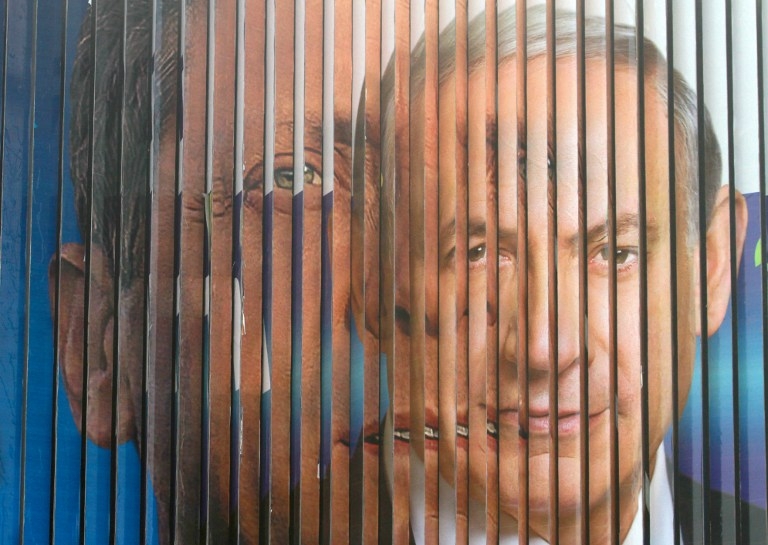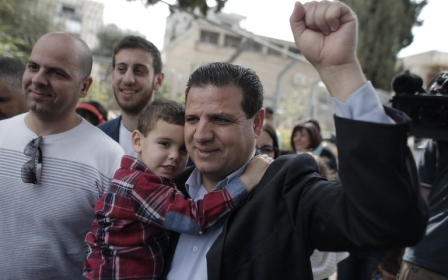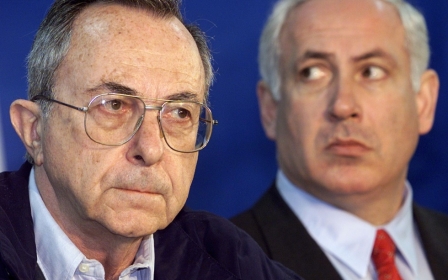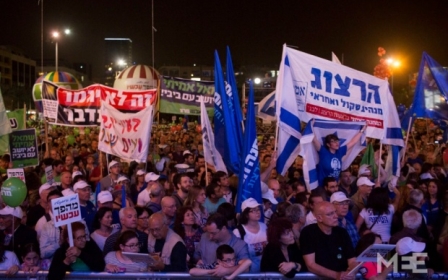Bibi or Buji: No change either way

There are five states of Israel, only two of which are going to the polls today. There is the Jewish state which is a democracy for its Jewish citizens only. These voters are unsentimental about their political leaders and prepared to topple, or even jail them.
There is the state under which non-Jewish citizens of Israel live, in which they can vote, but after 67 years, a state and society in which they remain unintegrated. This state has honed discrimination to a fine art, producing over 50 pieces of legislation designed in deed, if not in word, to curtail the rights of non-Jews to buy back the land that was once confiscated from them by the state, to expand their villages, to build, or to live in Jewish communities. Rights that were once upheld by Israel’s courts are annulled by the Knesset’s laws. Increasingly, the people whom Israelis refer to as Israeli Arabs define themselves as Palestinians from 1948. There is a world of difference between the two. They, too, will vote today.
Then there is the state of Jerusalem, in which East Jerusalemites have residency but are stateless. They hold no passport, nor citizenship. If they do, they lose their residency. The weapon of choice to limit their numbers is Judaisation and a raft of legislation, such as the centre of life law designed to make it as a difficult as possible to keep their status as residents. The children of veteran PLO negotiator Hanan Ashrawi lost their blue ID cards.
Then comes the West Bank, which operates under Israeli apartheid, in some aspects more cruel than its South African antecedent. Under its regime, the West Bank has been diced by a giant chopping knife. Separate roads, settlements blocks, walls and checkpoints ensure that the land all Israelis still call Judea and Samaria loses all physical cohesion or coherence for its Palestinian inhabitants, while maximising both for settlers. The fast road network links settlers umbilically to the coast and the economic heartland of Israel. The roads for Palestinians create three hour drives out of 15 minute journeys. Then there is Gaza, which is a prison camp, for which Israel has found a fellow warden in Sisi’s Egypt.
The election campaign has kept faith with the nature of the Jewish state itself, in that it has been a contest of identities. For the most part, its back has been turned on the main issue confronting any future leader of the country - a settlement of the conflict. If the electorate behave as if there is nothing they can do about it so, too, has the election campaign itself.
The election itself, which Netanyahu called and which he must now be regretting, has opened up the valve on a head of steam building up in the security establishment. This has challenged Netanyahu's core claim to be a safe pair of hands with Israel's security. A prime minister who has a phalanx of former security chiefs, led by former Mossad chiefs Meir Dagan and Shabtai Shavit, campaigning against him for misrepresenting the nuclear threat posed by Iran and mismanaging the relationship with America, is a prime minister courting disaster.
Denounced by the military and security establishment, outflanked by the national religious right, Netanyahu has gone further and further to the right. He said at the start of this month there would be “no withdrawals” from the West Bank if he were re-elected and “no concessions” to Palestinians, although his office denied that this nullified his much trumpeted commitment to a Palestinian state made in a speech in Bar-Ilan University in 2009. By the end of the campaign, what little ambiguity has been woven around Netanyahu’s core objection to a Palestinian state has been blown away.
Netanyahu said: “I think that anyone who is going to establish a Palestinian state today and evacuate lands is giving attack grounds to the radical Islam against the state of Israel. There is a real threat here that a left-wing government will join the international community and follow its orders.”
But look to his main challenger - and this contest is significant in that a credible challenger does exist - and you seek in vain for relief.
Isaac Herzog of the Zionist Union, which comprises Labor and former Likudniks like Tzipi Livni, talks the talk of inclusivity. “I promise: I will be a prime minister to everyone. For right and left, for settlers, Haredim, Druze, Arabs, Circassians; I will be prime minister for the centre and for the periphery.”
But the Zionist Union’s vision of a final status settlement says otherwise. It states:
“Demilitarizing the Palestinian state, keeping the settlement blocs in Judea and Samaria [the West Bank] under Israeli sovereignty; strengthening Jerusalem and its status as the eternal capital of the State of Israel and ensuring religious freedom and access to the holy sites to all religions, along with maintaining Israeli sovereignty; resolution of the Palestinian refugee problem through the establishment of a Palestinian state and not within Israel.”
Which settlement blocs? When asked what land he would keep at an event hosted by the Jerusalem Post, Herzog replied: “In the ideal world, I would like to keep it all.” But he said he would keep the Gush Etzion, Ma’aleh Adumim and Ariel blocs, and that the Jordan River would be his “security border”.
No Palestinian right of return, no evacuation of the settlement blocs (or even a nominal return to the Green Line, which is the starting point of the Arab Peace Initiative), Jerusalem as “the eternal capital of Israel” - what has changed here from the map produced by Ehud Barack, except, of course, that Herzog rejects a nominal right of return to the Israel of 1948? And Gaza - no change there - it is out of the picture until Hamas has been demilitarised.
For the second state of Israel, its non-Zionist minority of Palestinian nationalists, communists, Islamists, this election has produced an unexpected opportunity. Raising the threshold of entry into the next Knesset, a move designed by Avigdor Lieberman to limit Arab representation in the Knesset, might have had the opposite effect. Jamal Zahalka, the leader of Balad, succeeded in uniting the parties under one list, which is something of a historical first. If the turnout of Palestinian voters approaches anything like the turnout of Jewish voters, the list could return up to 15 seats, which would make it the leader of the opposition, a bloc the Israeli government has by law to consult. By any calculation, representation in the Knesset of non-Zionists is set to increase from its current level of 11 seats, although a boycott is also gathering pace.
In all the scenarios that this election could produce - and Netanyahu has struggled against opponents who defines themselves as “anyone but him” - the least likely scenario is a government prepared to make radical land concessions required for a separate Palestinian state. The most likely is a government which carries on with business as usual.
This does not mean the absence of all movement. Underneath the surface, there are encounters taking place between parties you would not expect to be speaking to each other. But among the tribes of Israel, the Ashkenazi liberal left is now the last place you should look for inspiration. Asked to choose between liberalism and Zionism, it is Zionism - as enshrined by the Law of Return - which surfaces time and again. The moral and historical imperative, as they see it, to settle in Israel renders them blind to seeing anyone else’s moral and historical rights.
As this conflict approaches its eighth decade, it becomes less about maps, borders or the label given to a solution - one state, two state or no state. The essential precursor to any solution - a will to recognise the equal rights of non-Jews to land, water, ports, airspace, oil and gas, fish, in any of the five states that Israel controls - is absent. Whether that refusal is best represented by a Bibi who says no concessions or a Buji whose idea of an ideal world is that Israel keeps all of the land it has occupied, I leave that for others to judge.
-David Hearst is editor-in-chief of Middle East Eye. He was chief foreign leader writer of The Guardian, former Associate Foreign Editor, European Editor, Moscow Bureau Chief, European Correspondent, and Ireland Correspondent. He joined The Guardian from The Scotsman, where he was education correspondent.
The views expressed in this article belong to the author and do not necessarily reflect the editorial policy of Middle East Eye.
Photo: A rotating billboard in Tel Aviv shows Israeli Prime Minister and Likud party's candidate Benjamin Netanyahu and Israeli MP Labour Party leader and co-leader of the Zionist Union party, Isaac Herzog (AFP)
New MEE newsletter: Jerusalem Dispatch
Sign up to get the latest insights and analysis on Israel-Palestine, alongside Turkey Unpacked and other MEE newsletters
Middle East Eye delivers independent and unrivalled coverage and analysis of the Middle East, North Africa and beyond. To learn more about republishing this content and the associated fees, please fill out this form. More about MEE can be found here.





